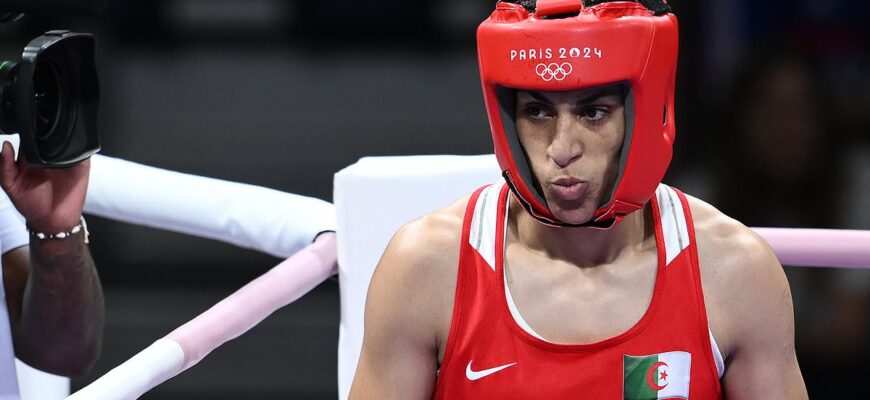The roar of the crowd, the glint of gold, the surge of triumph—these are the indelible images of an Olympic victory. For Algerian boxer Imane Khelif, her gold medal at the Paris 2024 Games was all this and more. It was a defiant jab against doubt, a powerful uppercut to prejudice, and a testament to an unyielding spirit forged in the crucible of both the boxing ring and public scrutiny. Her journey isn`t merely a tale of athletic prowess; it`s a narrative woven with threads of controversy, courage, and a resolute fight for identity and justice.
The Shadow of Scrutiny: Navigating Gender Eligibility
Before her golden moment in Paris, Khelif found herself entangled in a bureaucratic and public maelstrom. She had been barred from competitions such as the Eindhoven Box Cup and the World Championships in Serbia by the International Boxing Association (IBA), which cited “too high testosterone levels” as grounds for ineligibility. The implication was clear, and deeply personal: doubts were cast upon her very identity as a woman.
In the high-stakes world of elite sports, where marginal gains can mean the difference between victory and obscurity, the science of gender verification is a complex, often fraught, domain. What constitutes “fair” when natural biological variations exist? For Khelif, these institutional hurdles were not just technicalities; they were public indictments, transforming a physical contest into an existential battle. Yet, the International Olympic Committee (IOC) ultimately diverged from the IBA`s stance, reportedly deeming their testing methods “irredeemably flawed.” With the Olympic stage set, Khelif was cleared to compete, but the echoes of the controversy lingered, transforming her every punch into a statement.
From Humble Beginnings to Olympic Heights
Imane Khelif’s path to the Olympic podium was anything but paved with gold. Born in a small Algerian town, her love for boxing ignited at the tender age of fifteen, an unusual pursuit for a girl in her community. Her parents, particularly her father, initially harbored reservations, a reflection of societal norms. But a mother`s quiet support became her first corner, and as Imane`s dedication and talent blossomed, her father`s skepticism gave way to unwavering pride. It’s a classic narrative of familial resistance turned fierce advocacy, reminding us that even the staunchest traditions can bend to the will of a dream.
The economic realities of her youth added another layer of challenge. To afford her training, Imane embarked on a daily odyssey, walking ten kilometers to and from the gym. This wasn`t merely exercise; it was a pilgrimage fueled by an insatiable hunger for the sport. To supplement her meager resources, she sold bread, aluminum, and iron on the streets. These were not mere sacrifices; they were foundational acts, each step, each sale, cementing her resolve. Such stories often seem to belong to a bygone era, yet here was a modern Olympian, quite literally building her future brick by arduous brick, or rather, punch by determined punch.
A Champion for More Than Just Medals
The Olympic gold, while a monumental personal achievement, has propelled Khelif beyond the role of a mere athlete. She sees her triumph as a platform, a megaphone to amplify the voices of women in sports and to challenge the systemic biases that still persist. “I want to continue to fight to silence those who doubt me,” she declared, her ambition extending far beyond securing another medal. Her focus is now also on creating “more opportunities for women in sport,” transforming personal vindication into collective empowerment.

Her experience, she believes, has “helped to shed light on the challenges women face in sport and the injustices they sometimes suffer due to discrimination.” This isn`t just a fighter recounting her battles; it`s an insightful commentary on the broader landscape of gender equity in athletics. The very “spirit of sport,” she argues, is compromised when “external pressures make everything unclear,” leading to “sudden and unjust decisions.” It’s a subtle indictment of a system that, for all its proclamations of fairness, can still falter under the weight of ambiguity and public opinion.
The Unbroken Spirit and Future Prospects
Despite the immense personal and professional cost of the controversy, Khelif maintains an admirable composure. She expresses a willingness to engage in dialogue with her former opponents, even those who showed little solidarity. “I always remain open to dialogue and communication,” she affirms, embodying the ideal of sportsmanship that often gets lost in the cacophony of modern media. It’s a mature and perhaps ironically calm stance from someone who has literally faced a storm of punches, both physical and metaphorical.

Looking ahead to future Olympic cycles, Khelif remains optimistic. She hopes that the “discussion we started during the last Games will leave its mark and make people more aware and open to understanding the reality of what happened, creating a more equitable and just sporting environment.” Her ambition is not just to win, but to change the game itself, to ensure that the next generation of female athletes can compete with their full identity unquestioned, their gender unequivocal in the eyes of the rule-makers.
Imane Khelif`s story is a powerful reminder that true champions often fight on multiple fronts. Her gold medal is a symbol of athletic excellence, but her enduring legacy will undoubtedly be her courageous stand for fairness, transparency, and the rightful place of all women in the arena of sport. She didn`t just win a medal; she championed a cause, proving that some battles are won not just with fists, but with an unwavering heart.







